Best Managed SOC Providers in the UK: Complete Selection Guide 2026
These days, cyber attacks are just part of doing business – and the UK is no exception. The government's latest Cyber Security Breaches Survey shows that 43% of UK businesses faced cyber attacks in 2024, with phishing hitting 85% of victim organisations. For medium and large businesses, each successful attack costs an average of £10,830 - which explains why more companies are turning to managed SOC providers for round-the-clock protection.

When it comes to cyber security, you either invest in prevention or pay for the consequences. Managed Security Operations Center (SOC) providers offer 24/7 security monitoring and incident response services, giving businesses access to enterprise-level protection without the massive overhead and delay of building their own security operations centers.
Most guides don’t tell you that picking the right managed SOC provider isn’t just about finding the best one. No - it's about finding the right fit for your organisation. A global enterprise solution that works perfectly for a 5,000+ employee multinational might be complete overkill (and overpriced) for a company 1/10 the size. And a budget provider might appear to tick all the boxes on paper but lack the industry expertise or response capabilities your business needs.
This is all to say that not all managed SOC providers are built the same. Some serve large enterprises, others focus on specific industries, and many simply don't understand the unique challenges facing UK SMEs. The trick is matching your organisation's size, sector, and security maturity with a provider that genuinely understands your world.
In this post, we’ll cut through the background noise to help you find a perfect match.
Check out our comprehensive guide to choosing the right outsourced SOC provider for your business.
What Are Managed SOC Providers
Let's get down to the basics. A Security Operations Center (SOC) is essentially the nerve center of an organisation's cybersecurity operations. It's where security analysts monitor networks, investigate threats, and respond to incidents around the clock. A digital command center of sorts.
The "managed" part just means you're outsourcing this entire operation to a specialist provider. Instead of hiring your own security team, building a SOC facility and maintaining expensive security tools, you partner with experts who already have everything in place. Your managed SOC service provider becomes your extended security team, watching over all your systems so you can focus on running your business.
Core Managed SOC Services
Most managed SOC providers offer these core services:
- Security monitoring: Continuous surveillance of your networks, endpoints, and applications using advanced tools like SIEM (Security Information and Event Management) platforms.
- Threat detection: Identifying suspicious activity, malware, and potential breaches before they cause serious damage.
- Incident response: If something goes wrong, your SOC team jumps into action to contain the threat and minimise impact.
- Threat hunting: Proactive searching for hidden threats that automated tools might miss.
- Vulnerability management: Regular scanning and assessment of your systems to identify security weaknesses.
- Forensic analysis: Deep-dive investigations into security incidents to understand what happened and prevent future attacks.
- Compliance reporting: Documentation and reports to help meet regulatory requirements like GDPR or industry standards.
Managed vs In-House SOC Comparison
Building an in-house SOC comes with a hefty upfront investment. You need skilled analysts (who command high salaries), expensive security tools and ongoing training to keep up with evolving threats. Not to mention you need staff working 24/7, 365 days per year – and that’s no easy feat. For most UK businesses, this is just too much.
Managed SOC providers are able to spread these costs across multiple clients, making enterprise-level security accessible to businesses of all shapes and sizes. You get immediate access to experienced analysts, cutting-edge tools, and round-the-clock monitoring without the massive capital investment or staffing headaches.
Why UK Businesses Choose UK-Based Managed SOC Providers
When you're thinking about managed SOC stuff, location can be easy to miss. Providers from other countries might say they cost less, but more and more UK businesses are choosing someone based here – and that's a smart move.
Data sovereignty
Under GDPR and UK data protection laws, businesses remain ultimately responsible for how personal data is processed. A provider based in the UK will be subject to the same legal jurisdiction as your business, making GDPR compliance simpler. If you're using an offshore provider, you risk vague data handling practices and little control over their practices. UK providers understand the nuances of UK privacy laws and often maintain data centers within UK borders.
Time zone
Sure, managed SOC providers keep an eye on your systems 24/7, no matter where they are, but it's just easier to work with someone in the UK. Setting up meetings, going over reports, planning to make your security better, or getting updates on what's going on – it all goes smoother when your SOC team is working when you are.
Local threat intelligence
UK-based SOC providers know what it's like to work with UK companies. They know the tricks people use to attack your industry and often talk to UK law enforcement. Knowing what's happening here helps them spot attack patterns in your area or industry that someone from another country might miss.
Culture and communication
It’s also important to not overlook the cultural element and communication nuances when you’re in a security scuffle, communication is critical. A UK based analyst understands the business culture in the UK and how to engage a complaint regulator and can speak plain English instead of technical language that may not have the same connotations across cultures and languages.
Often the advantages of working with a UK based SOC provider outweigh cost savings from alternatives. This is especially common for companies working with sensitive user data or operating in highly regulated industries like finance. The question isn't whether you save money - it's whether you get the right protection for your specific needs.

Types of Managed SOC Providers in the UK
The managed SOC market isn't all the same. There are different kinds of providers aimed at different sectors, business types, sizes and more. Knowing the differences can keep you from wasting money.
Enterprise-focused providers
Think IBM, Accenture, BT – big names everyone knows. These providers have huge SOCs that watch over thousands of companies at once. They're impressive, no doubt about it.
If you're running a multinational with complex infrastructure, these providers have the resources to handle virtually anything you throw at them. They've seen every type of attack, work with major security vendors, and have scale on their side.
The flip side? You're paying premium prices for enterprise-grade services you might not need. Most importantly, you'll often feel like you're just another ticket in their system. Good luck booking a quick call with an analyst or tweaking something for your industry.
These work brilliantly for large enterprises with complex, multi-national setups. For smaller businesses, it's often overkill.
SME-Specialist Providers
This is where things get interesting for most UK businesses. Providers like Reflective IT build the whole business around helping small to medium sized companies. They know your needs are different from a huge company.
What does that mean? You can talk directly to senior analysts, not just whoever answers the phone. These providers get that you have smaller budgets and face certain rules in your field. If something goes wrong, you're talking to people who understand businesses like yours.
The trade-off is scale. They're not monitoring tens of thousands of endpoints globally. But for most growing businesses, this works in your favour - you get more personalised attention and services tailored to your actual needs.
Technology Vendor SOCs
Microsoft, for example, offers security services built around their ecosystem. If you're heavily invested in Microsoft 365 and Azure, this approach can make sense.
The integration is usually seamless, and pricing can be attractive when bundled with existing licenses. But you're essentially putting all your security eggs in one vendor's basket. What happens when you need tools or perspectives they don't offer?
Hybrid/Co-Managed Options
Some organisations split the difference - handling basic monitoring internally while outsourcing complex incident response. It keeps your team involved while accessing specialist expertise when needed.
The success of this approach really depends on having the right internal capabilities and clear boundaries about who handles what.
Key Questions to Ask Managed SOC Providers
This is where things get real. Anyone can make a fancy sales pitch, so you need to ask the right questions to find the providers who can really do the job. Don't be afraid to ask a lot – you're trusting these people with your security.

Team and Enterprise Questions
- What certifications do your SOC analysts hold? You want to hear about CISSP, GCIH, SANS certifications, and other recognised security credentials.
- What's your average analyst experience level? This reveals whether you're getting seasoned professionals or recent graduates learning on your infrastructure.
- Do you provide a dedicated account manager? Some providers rotate whoever's available. Others assign specific team members who learn your business inside out.
Tech and Capabilities Questions
- What SIEM and security tools do you use? Their answer should include well-known platforms like Sentinel, QRadar, or Splunk, along with details about threat intelligence feeds and detection capabilities. If they're vague about their technology stack, that's a red flag.
- How do you integrate with our existing security stack? Your new SOC shouldn't exist in isolation. They need to work with your current firewalls, endpoint protection, and other security tools. Ask for specific integration examples.
- What threat intelligence sources do you leverage? Quality threat intelligence separates good SOCs from great ones. They should use multiple commercial and open-source feeds, plus have relationships with industry groups and law enforcement.
Service Level and Process Questions
- What are your guaranteed response times? Critical alerts should trigger immediate response but make sure their definition of "immediate" matches yours. Some providers consider four hours "immediate" - others mean five minutes.
- How do you handle escalation procedures? When something serious happens, you need clear escalation paths. Who gets involved and when? How do they communicate with your team?
- What reporting do you provide and how often? Monthly summaries are standard, but you might need weekly tactical reports or real-time dashboards. Make sure their reporting schedule matches your needs.
- How do you manage false positives? Every SOC generates some false alarms. The question is whether they fine-tune their systems to reduce noise over time or just keep forwarding everything to you.
Managed SOC provider pricing models
Talking about prices with SOC providers can get confusing fast. Everyone seems to do it differently, which makes it hard to compare. Here are some of the most common pricing plans:
Per-User Pricing Models
The simplest approach - you pay a monthly fee for each person in your organisation. It's straightforward for budgeting, and you know exactly what happens when you hire someone new or when people leave.
This works well for companies where everyone needs roughly the same level of security coverage. The downside comes when you've got a mixed workforce - why should the part-time bookkeeper cost the same to monitor as your IT director with admin access to everything?
Per-Device/Endpoint Pricing
Here, every laptop, server and phone gets its own price tag. Some providers love this model because they can charge different rates for different device types - servers cost more than basic workstations.
It makes sense if you've got lots of devices per person or a bring-your-own-device culture. But tracking everything becomes a real headache, especially when people swap equipment or you're constantly adding new IoT devices.
Tired Service Models
Most providers offer packages like "Bronze" "Silver," and "Gold" You get different levels of monitoring depth, response speed, and analyst attention based on which tier you choose.
The tricky bit is figuring out what you actually get at each level. One provider's "Silver" might be another's "Bronze" with fancy marketing names. Just make sure to ask what changes between tiers.
Bespoke Pricing
Sometimes none of the standard models fit. Maybe you need special compliance features, have legacy systems requiring extra attention, or want different service levels for different parts of your business.
Custom pricing offers flexibility but makes comparison shopping impossible. You're basically negotiating a unique deal every time, which can work in your favour or against it depending on your negotiation skills.
Our advice would be to not get too hung up on which pricing model a provider uses. Focus on understanding exactly what you're getting for your money and whether it matches your actual security needs.
SLA and Performance Metrics That Matter
Service Level Agreements sound boring and we're not going to tell you otherwise. But when something goes wrong, they become the most important document you've signed. Here are some of the things to watch out for:
Response time commitments
Critical security incidents should trigger immediate human review, not just automated acknowledgment. High-priority alerts warrant response within 15-30 minutes, while medium-priority issues could take a few hours.
Watch out for providers who define "response" as sending an automated email. Real response means a qualified analyst investigates and communicates findings back to you.
Resolution and Communication Processes
Resolution timeframes should reflect reality. Some SLAs promise unrealistic resolution times that force analysts to close tickets prematurely. Better providers focus on communication commitments - keeping you informed rather than rushing to hit arbitrary deadlines.
Reporting and Escalation Procedures
Reporting frequency needs to match your needs - monthly executive summaries, weekly operational reports, or real-time dashboards. Make sure your SLA specifies exactly what reports you'll receive and when.
The best SLAs include escalation procedures with clear paths for involving senior analysts when things go sideways.
Compliance and Certification Requirements
You should be working with a provider who understands your regulatory landscape. The stakes are too high to get it wrong. If you do, you'll be explaining to auditors why your SOC provider doesn't meet requirements.
GDPR and Data Processing
GDPR is at the foundation of any UK business. Your SOC provider processes personal data during monitoring, making them a data processor under GDPR. They need proper data processing agreements, clear retention policies, and documented security measures.
Essential UK Certifications
Cyber Essentials certification has become baseline for UK government work, with many private organisations now expecting it. Cyber Essentials Plus offers additional assurance through hands-on technical verification.
ISO 27001 certification indicates serious commitment to information security management with ongoing processes, regular audits, and continuous improvement. Providers with ISO 27001 tend to have more mature security practices.
Industry-Specific Standards
Industry-specific requirements add complexity. Financial services need FCA-familiar providers. Insurance companies want Solvency II understanding. Manufacturing might need industrial cybersecurity standards.
Third-Party Audit Reports
SOC 2 Type II reports provide detailed insight into provider control environments through third-party audits examining customer data protection and system availability over time.
Don't assume certifications guarantee good service - they're minimum qualifications, not performance indicators. But missing relevant certifications often signals providers who don't understand your industry or haven't invested in proper governance.

Technology Integration Requirements
Your SOC provider needs to fit your existing technology environment, not replace everything. Integration complexity often catches businesses off guard, so make sure not to get caught out.
SIEM and Security Tool Integration
SIEM platform compatibility determines visibility across your infrastructure. Firewalls, endpoint protection, email security, network monitoring - all need to feed information into SOC monitoring systems.
Microsoft ecosystem compatibility
Microsoft ecosystem integration deserves special attention since many UK businesses rely on Microsoft 365 and Azure. These platforms generate massive security telemetry but interpreting it requires genuine expertise. Providers with deep Microsoft knowledge understand alert tuning, recognise suspicious Azure AD activity, and leverage features you're already paying for.
Network Access and Connectivity
Some providers need VPN connections, others work through API connections and cloud integrations. Modern approaches favour API-based connections – they're often more secure and easier to manage than network tunnels.
Endpoint agents are another consideration. Will you install new monitoring agents on every device? How do these interact with existing endpoint protection? Some providers work with current tool data, others require their own software deployment.
Multi-cloud platform support
Cloud platform compatibility becomes critical for multi-cloud environments. Your provider should handle hybrid setups without separate monitoring solutions. The goal is unified visibility, not multiple dashboards.
Top 10 Managed SOC Providers in the UK
SME & Mid-Market Managed SOC Providers
1. Reflective IT (Top Pick for SMEs)
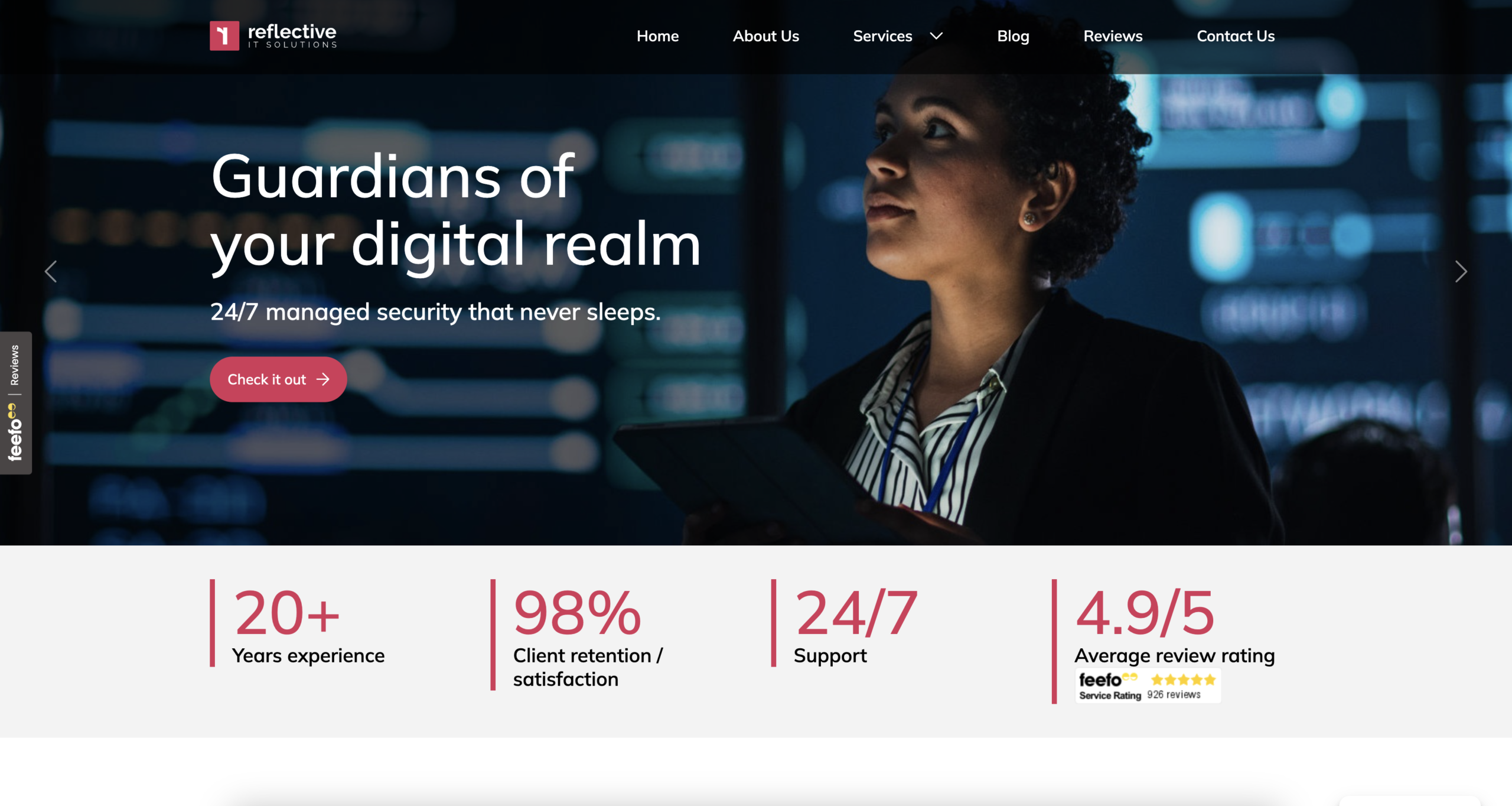
We’ve been helping UK businesses secure and manage their IT for over 20 years. Our managed SOC service is built for organisations that want peace of mind and straightforward protection without layers of red tape. With 4.9/5 verified ratings on Feefo from our clients, we’re proud of the reputation we’ve earned for reliability and personal service.
As your SOC partner, we don’t just monitor alerts - we actively hunt threats, investigate incidents, and guide you through response and recovery. And because we offer a full suite of complementary security services, including Incident Response Services and Disaster Recovery & Backup, you get complete coverage from a single trusted partner.
What you can expect with us:
- UK-based SOC with 24/7 monitoring and rapid response
- Transparent reporting and clear communication
- Flexible engagement models that grow with your business
- Access to a full range of security and IT resilience services
2. Redscan
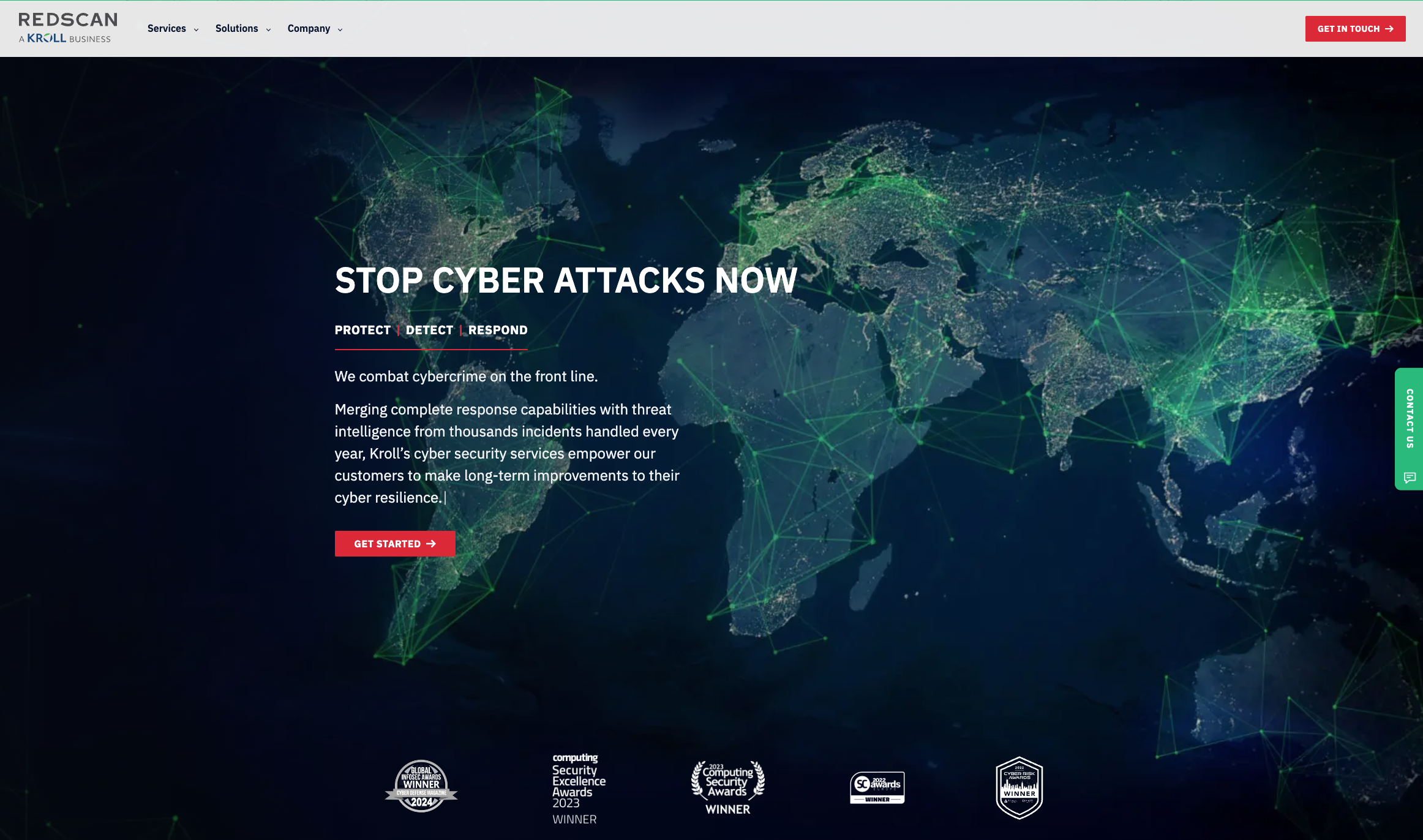
A well-established UK MSSP, now part of Kroll. Redscan’s SOC services include MDR, SIEM management, and penetration testing. They are particularly strong on compliance reporting and helping mid-sized businesses reduce false positives through tailored threat detection.
3. Evalian
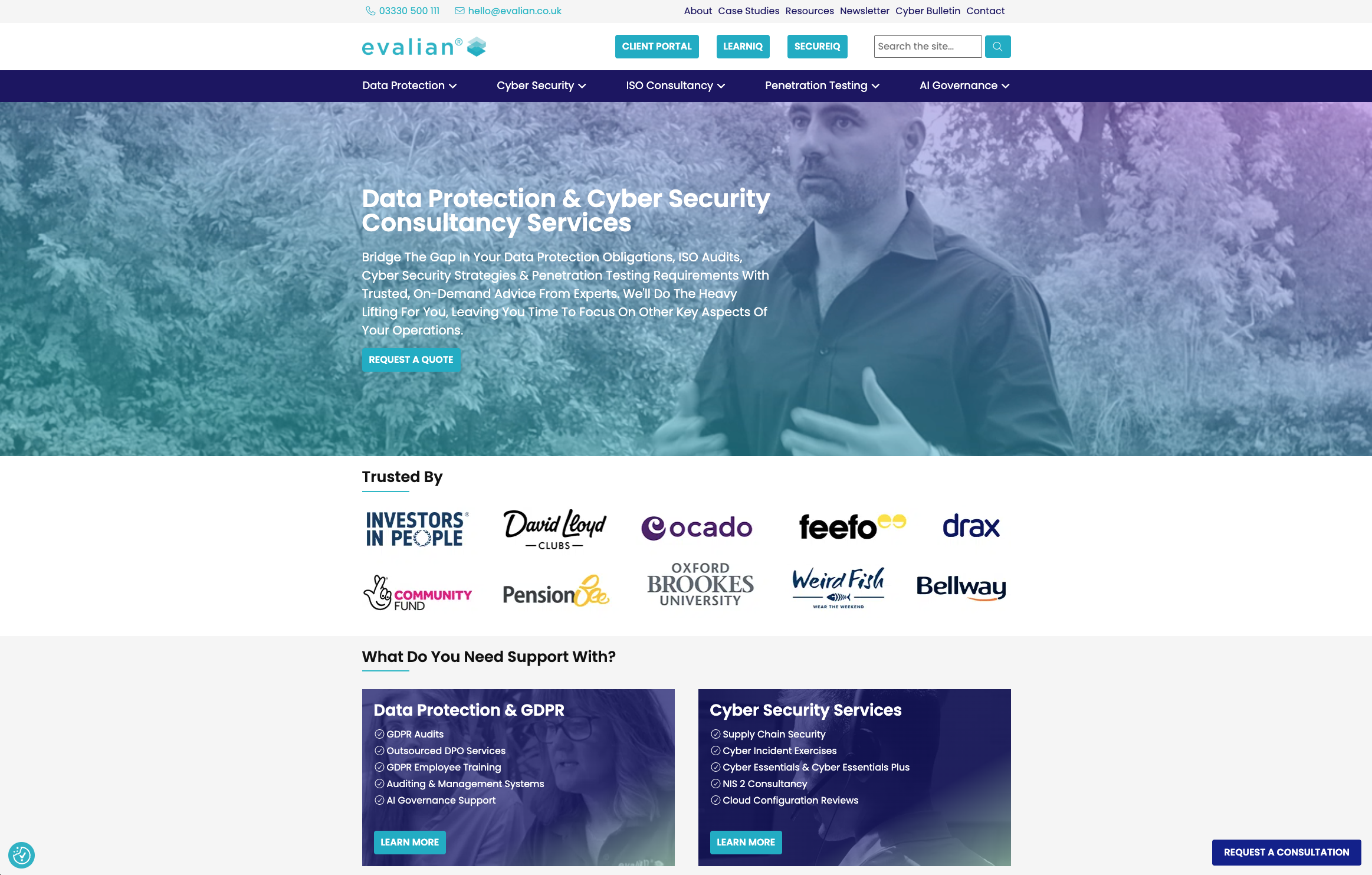
Evalian offers SOC-as-a-Service alongside advisory and compliance support. Their SOC covers 24/7 monitoring, incident response, and threat hunting, and they might be useful for businesses that also need guidance with GDPR, ISO 27001, and Cyber Essentials. The trade-off is that Evalian leans more towards consultancy, so SOC services may not feel as central to their business as with pure-play MSSPs.
4. Nomios

An international MSSP with a UK presence. Nomios provides SOC services across networks, endpoints, and multi-cloud environments. Their approach emphasises strong governance and clear onboarding, making them suitable for mid-market businesses with diverse or hybrid IT estates. They’re less “boutique” than providers like Reflective, but scale well for larger SMEs.
5. LittleFish
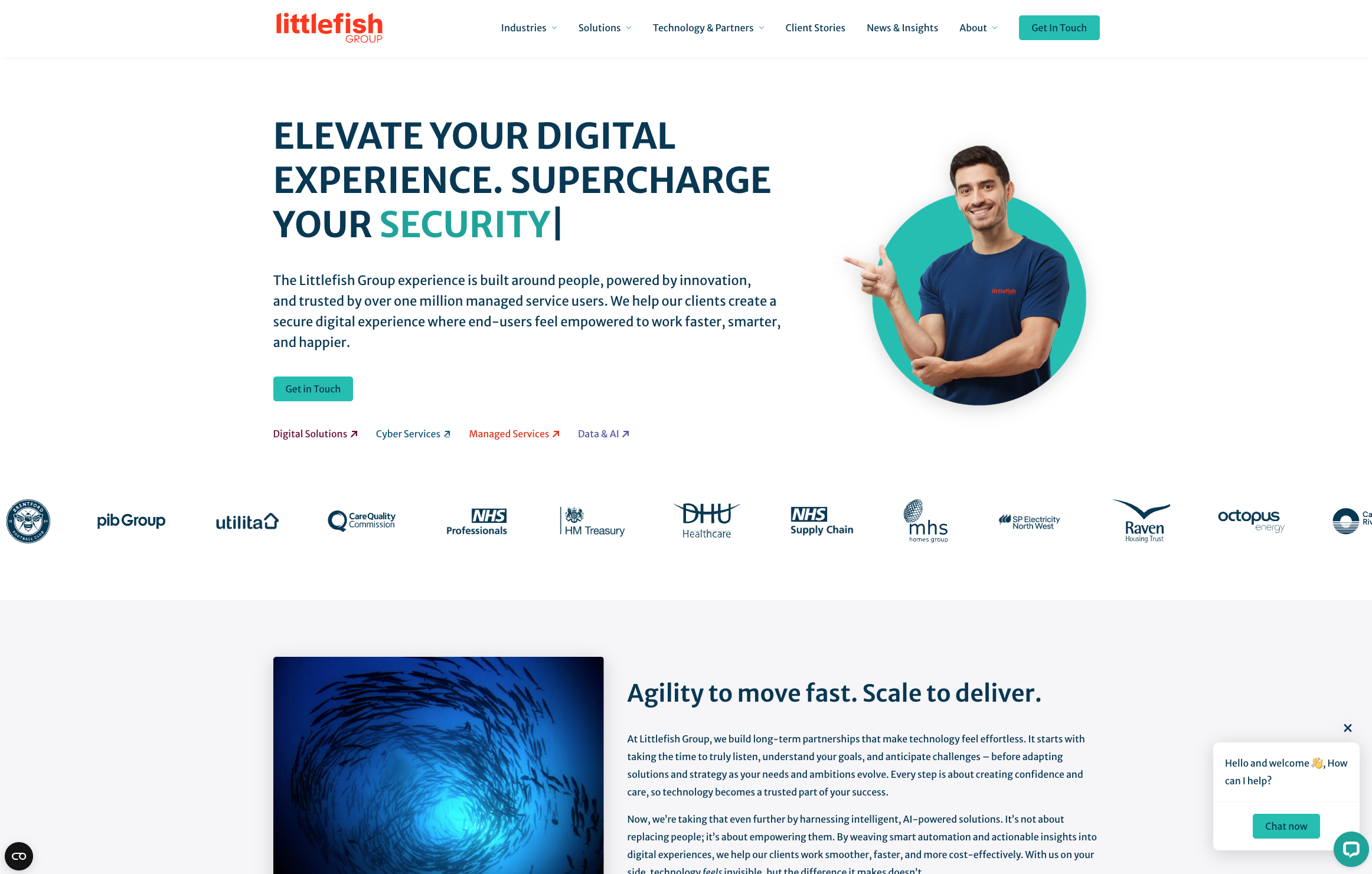
LittleFish is a UK-based managed IT and security provider. Their managed SOC offering delivers continuous monitoring and incident response, with a big focus on accessibility and customer support. They’re a decent fit for SMEs that want to combine SOC with broader managed IT services.
6. UBDS Digital

London-based SOC provider offering 24/7 coverage with AI-driven detection tools and SC/DV cleared analysts. They’re strong in government and public sector projects but less widely known in the SME private market.
Enterprise-Focused Managed SOC Providers
These providers are good options for large organisations with exceptionally complex infrastructure, multinational operations, or strict compliance requirements.
7. BAE Systems Applied Intelligence
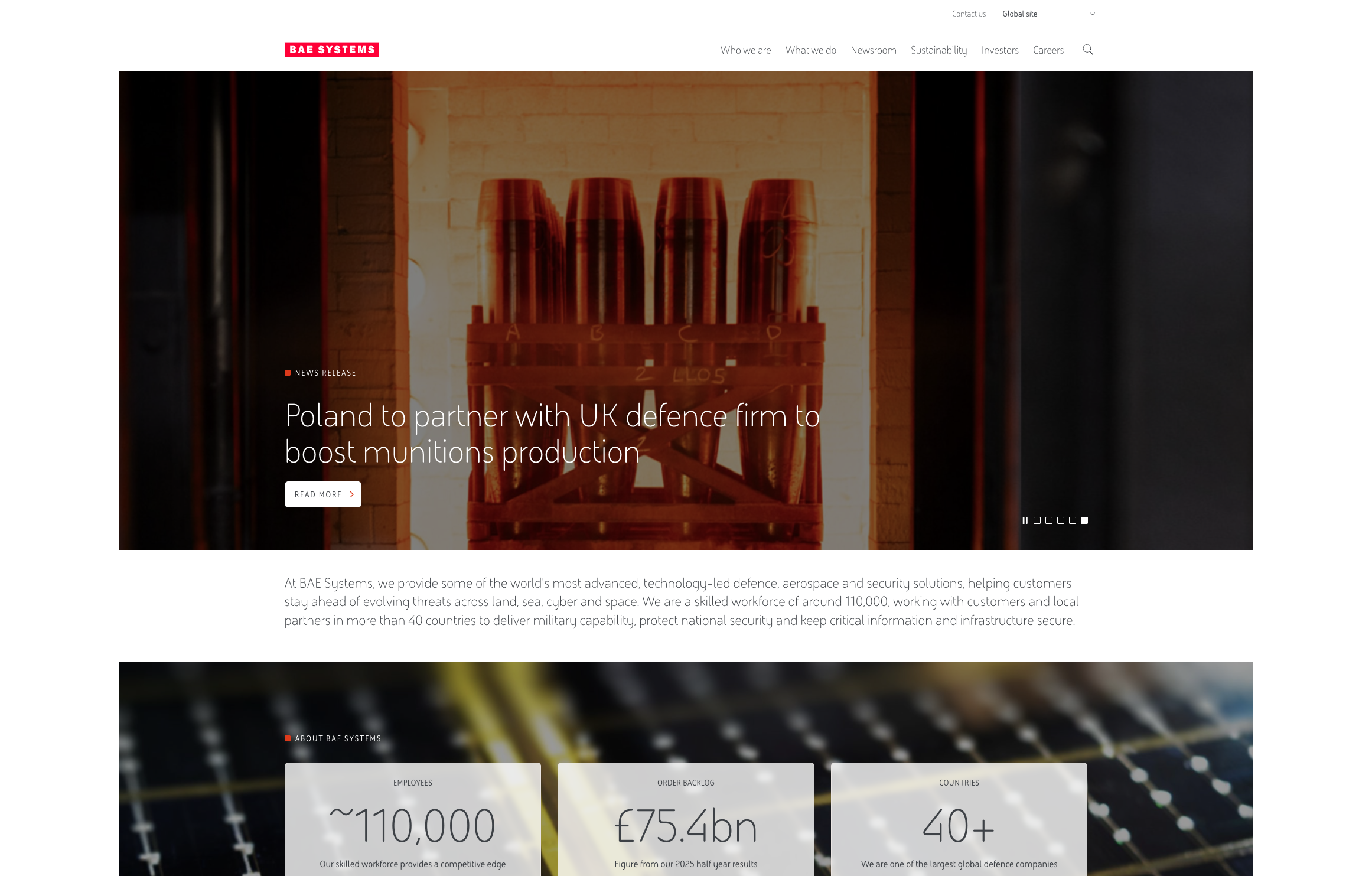
One of the UK’s most established cyber defence companies, BAE Systems provides SOC services for government, defence, and critical national infrastructure. Their strength lies in deep threat intelligence and experience handling nation-state level threats. For SMEs, however, their services are usually too complex and costly.
8. IBM Security
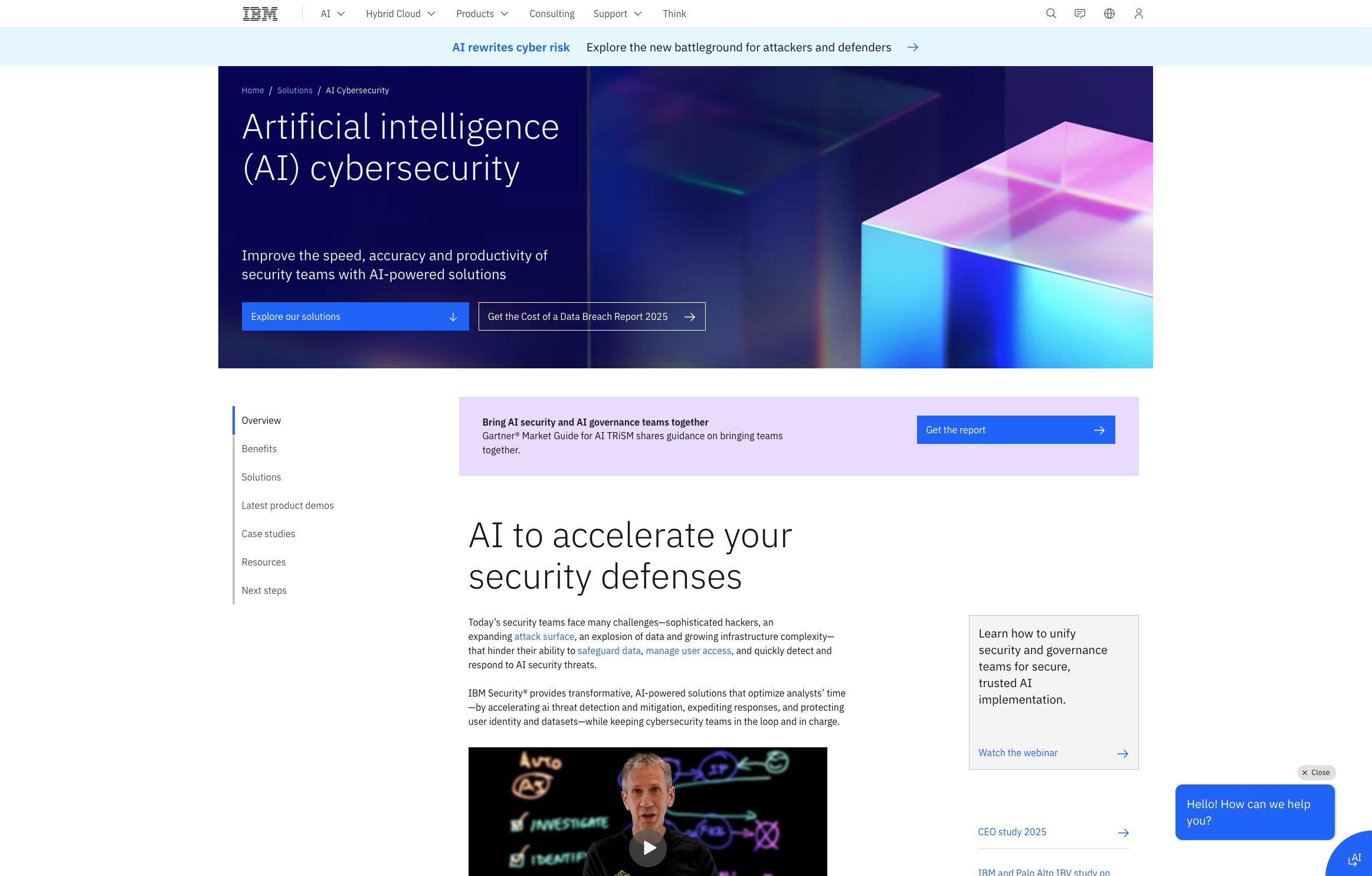
IBM operates a global network of SOCs and offers MDR, SIEM management, and advanced threat intelligence. Their scale means they can handle extremely large and complex environments. The downside: long onboarding times and less personalised service for smaller customers.
9. Atos
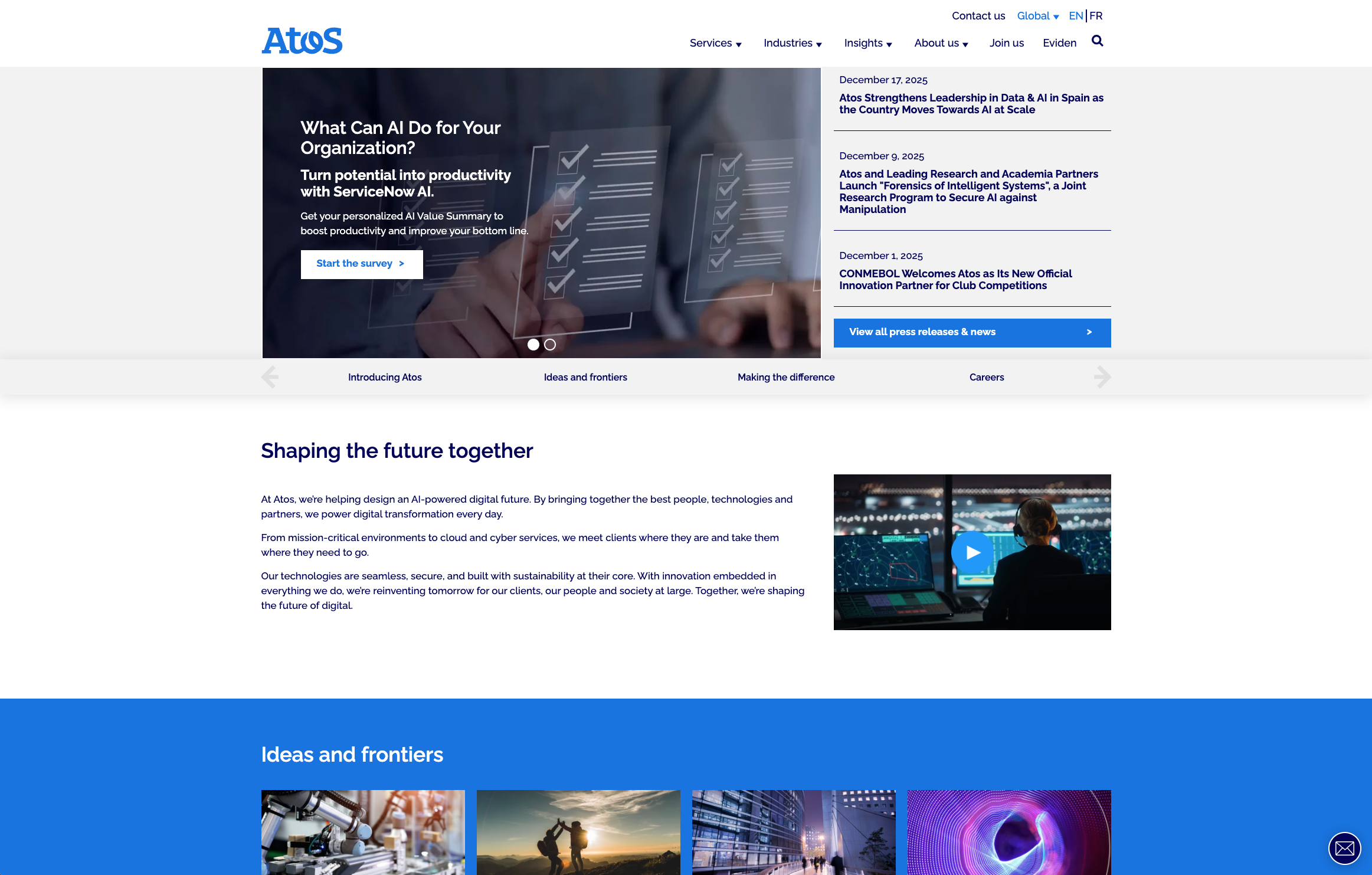
A global IT and digital transformation leader with a strong SOC practice in the UK. Atos is often chosen by enterprises already using them for infrastructure or cloud services. Their strength is in bundling SOC with large-scale IT outsourcing, though this can make their offerings less flexible for standalone SOC buyers.
10. Capgemini

Capgemini combines SOC services with consulting and systems integration, making them attractive for enterprises undergoing large digital transformation projects. Their governance and compliance frameworks are robust, but smaller businesses may find their approach too heavy and expensive.
Getting Started with Managed SOC Providers
Selecting the right SOC partner isn’t only a procurement decision — you’re making a long-term commitment to your business’s resilience.
By now you’ve seen how UK managed SOC providers differ: from enterprise giants with global scale to SME specialists like us who put personal service at the forefront of what we do.
The next step is turning this insight into action. Define the outcomes you want — whether that’s faster incident response, stronger compliance, or simply peace of mind — and then measure providers against those outcomes. That way you’ll move beyond comparing feature lists and ensure your chosen SOC provider actively supports your security strategy for years to come.
Ready to take the first step? Get your free SOC consultation.
FAQs
How much does a managed SOC provider cost in the UK?
Pricing models vary. Some providers charge per user, others per device, and many offer tiered service packages. Costs typically reflect factors like the size of your organisation, the scope of monitoring required, and the level of incident response included. When comparing managed SOC providers, focus less on the headline figure and more on what’s actually covered.
How long does implementation take?
Most providers complete onboarding in a matter of weeks. A typical process includes assessment, tool deployment, configuration, and full 24/7 monitoring. Complexity and existing systems will affect the exact timeline.
What’s the difference between a managed SOC and an MSSP?
A managed SOC provider is dedicated to continuous threat monitoring, detection, and incident response. An MSSP may offer broader IT security services such as firewall management or patching. Many MSSPs now integrate SOC capabilities, but depth of detection and response varies.
Do I still need an internal security team if I use a managed SOC?
It depends. SMEs often outsource security operations entirely, while enterprises may keep an internal team for governance and escalation. Some providers also offer co-managed SOC models, where responsibilities are shared.
Can I terminate a managed SOC contract early?
Contract flexibility differs by provider. SME-focused SOCs often offer shorter terms, while enterprise providers may require multi-year commitments. Always review contract conditions carefully.
How quickly do managed SOC providers respond to incidents?
Response times vary. Great providers guarantee immediate human triage for critical alerts, while others define “immediate” more loosely. Look for clear SLAs that outline times for critical, high, and medium alerts.
How do managed SOC providers handle GDPR and UK data privacy?
UK-based managed SOC providers must comply with GDPR and UK data protection law. They typically keep data in UK data centers and follow strict processing agreements. If considering offshore SOCs, confirm exactly where your data is stored and how it’s managed.